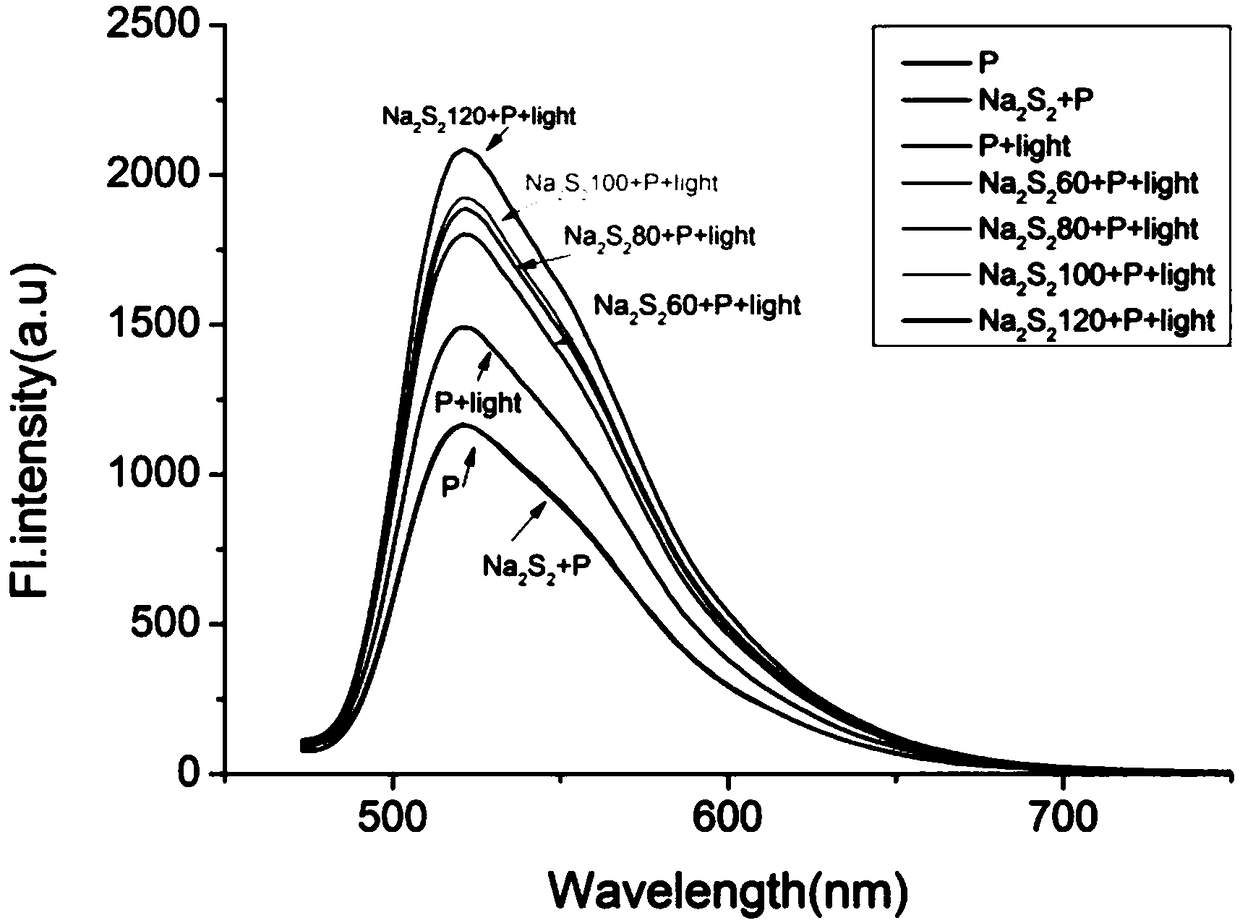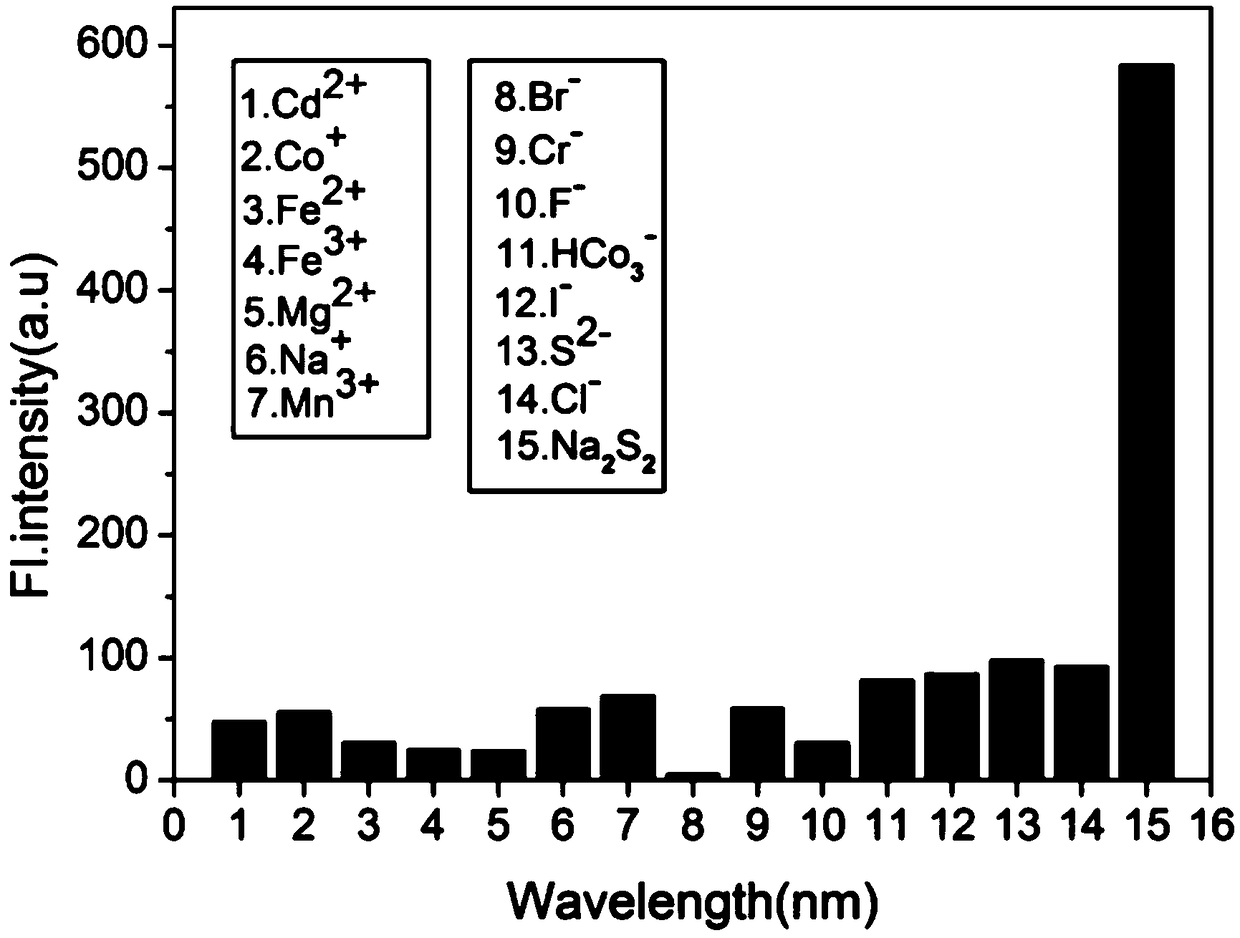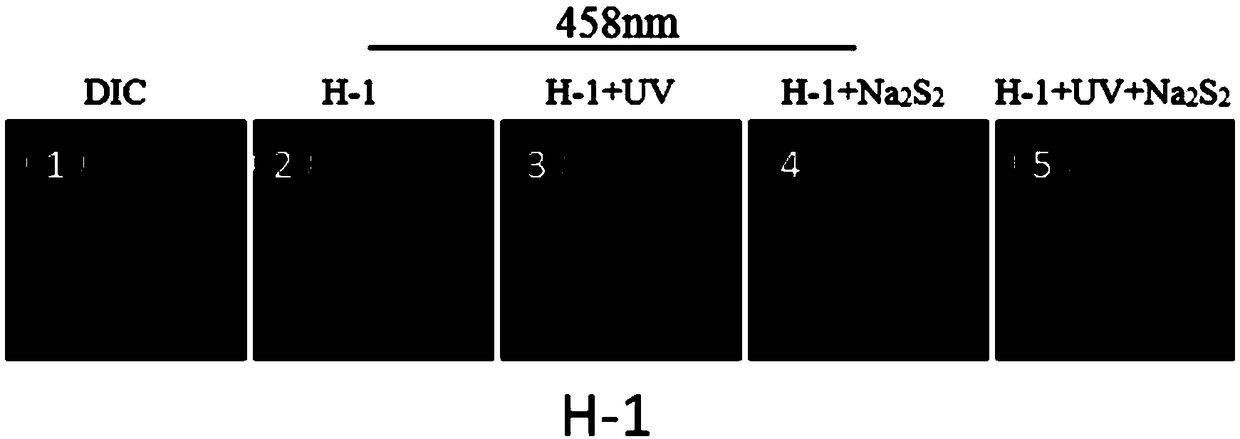A fluorescent probe for accurately detecting H2S2 in mitochondria through light regulation, its preparation method and application
A fluorescent probe, H2S2 technology, applied in the field of organic fluorescent probes, can solve the problems of unavoidable interference and lack of convincing research results, and achieve the effect of good cell permeability and good mitochondrial targeting.
- Summary
- Abstract
- Description
- Claims
- Application Information
AI Technical Summary
Problems solved by technology
Method used
Image
Examples
Embodiment 1
[0027] Precise detection of intramitochondrial H by photoregulation 2 S 2 The preparation method of the fluorescent probe is as follows:
[0028] (1) Dissolve 0.8g fluorescein in N,N-dimethylformamide DMF, then add 0.93g of K 2 CO 3 and 0.18ml of bromopropyne, wherein bromopropyne has 80% volume ratio in toluene, then stirred at 60°C for 1h, diluted the reaction mixture with water, then extracted and spin-dried, and purified by silica gel column chromatography to obtain fluorescent propyne monobromide. 1H NMR (300MHz, CDCl 3 ):δ10.14(s,1H),8.02(t,J=6Hz,1H), 7.82(t,J=7.5Hz,1H),7.75(t,J=7.5Hz,1H),7.30(d, J=6Hz, 1H), 7.01(d, J=3Hz, 1H), 6.74(m, 3H), 6.58(s, 1H), 4.89(d, J=1.5Hz, 2H), 3.62(d, J=1.5 Hz, 1H).
[0029] (2) Add 106 mg of N,N-dimethylformamide EDCI to 10 ml of dichloromethane in an ice bath, then add 193.9 mg of photoprotective group and 7 mg of 4-dimethylaminopyridine DMAP and stir for 10 min, 250 mg of fluorescein monobromopropyne was finally added and stirre...
Embodiment 2
[0033] Precise measurement of intramitochondrial H by light regulation 2 S 2 The preparation method of the fluorescent probe is as follows:
[0034] (1) Dissolve 1g of fluorescein in 4.5ml of N,N-dimethylformamide DMF solution, then add 1.16g of K 2 CO 3 And 0.244ml of bromopropyne, wherein bromopropyne has 80% volume ratio in toluene, then stirred at 60°C for 3h, diluted the reaction mixture with water, then extracted and spin-dried, and purified by silica gel column chromatography Obtain fluorescein monobromopropyne;
[0035] (2) Add 53.75mg of N,N-dimethylformamide EDCI to 5ml of dichloromethane in an ice bath, then add 114mg of photoprotective groups and 3.42mg of 4-dimethylaminopyridine DMAP and stir for 20min , 128 mg of fluorescein monobromopropyne was finally added and stirred for 26 hours, then filtered, rinsed with dichloromethane, the filtrate was selected to dryness, and then purified by silica gel column chromatography to obtain photoprotected fluorescein mono...
Embodiment 3
[0038] Precise measurement of intramitochondrial H by light regulation 2 S 2 The preparation method of the fluorescent probe is as follows:
[0039] (1) Dissolve 1.8g of fluorescein in 9ml of N,N-dimethylformamide DMF solution, then add 2.33g of K 2 CO 3 and 0.455ml of bromopropyne, wherein bromopropyne has 80% volume ratio in toluene, then stirred at 60°C for 4h, diluted the reaction mixture with water, then extracted and spin-dried, and purified by silica gel column chromatography to obtain fluorescent monobromopropyne;
[0040] (2) Add 107.5mg of N,N-dimethylformamide EDCI to 10ml of dichloromethane in an ice bath, then add 236mg of photoprotective group and 6.85mg of 4-dimethylaminopyridine DMAP and stir for 30min , 249.06 mg of fluorescein monobromopropyne was finally added and stirred for 20 hours, then filtered, rinsed with dichloromethane, the filtrate was selected to dryness, and then purified by silica gel column chromatography to obtain photoprotected fluorescei...
PUM
 Login to View More
Login to View More Abstract
Description
Claims
Application Information
 Login to View More
Login to View More - R&D
- Intellectual Property
- Life Sciences
- Materials
- Tech Scout
- Unparalleled Data Quality
- Higher Quality Content
- 60% Fewer Hallucinations
Browse by: Latest US Patents, China's latest patents, Technical Efficacy Thesaurus, Application Domain, Technology Topic, Popular Technical Reports.
© 2025 PatSnap. All rights reserved.Legal|Privacy policy|Modern Slavery Act Transparency Statement|Sitemap|About US| Contact US: help@patsnap.com



